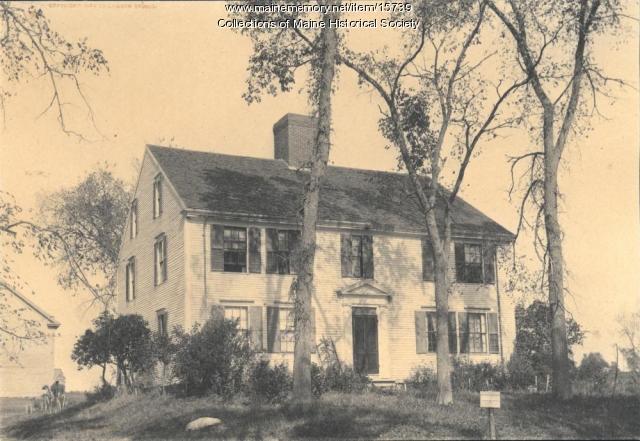Keywords: Farms and farming
Item 16056
Hapco Farms potato bag, Fort Fairfield, ca. 1975
Contributed by: Southern Aroostook Agricultural Museum Date: circa 1975 Location: Fort Fairfield; Riverhead; Hightstown; Elizabeth; Atlantic Media: Paper
Item 20381
Pettengill farm, Freeport, ca. 1920
Contributed by: Freeport Historical Society Date: circa 1920 Location: Freeport Media: Photographic print
Item 151760
Opportunity Farm fire escapes, New Gloucester, 1944
Contributed by: Maine Historical Society Date: 1944 Location: New Gloucester Client: Opportunity Farm Association Architect: Megquier & Jones Co.
Item 151882
Merrill Farms, Ellsworth, 1997
Contributed by: Maine Historical Society Date: 1997 Location: Ellsworth Clients: Merrill; Merrill Farms Architect: APM
Exhibit
Throughout New England, barns attached to houses are fairly common. Why were the buildings connected? What did farmers or families gain by doing this? The phenomenon was captured in the words of a children's song, "Big house, little house, back house, barn," (Thomas C. Hubka <em>Big House, Little House, Back House, Barn, the Connected Farm Buildings of New England,</em> University Press of New England, 1984.)
Exhibit
Blueberries to Potatoes: Farming in Maine
Not part of the American "farm belt," Maine nonetheless has been known over the years for a few agricultural items, especially blueberries, sweet corn, potatoes, apples, chickens and dairy products.
Site Page
View collections, facts, and contact information for this Contributing Partner.
Site Page
Presque Isle: The Star City - Farm Life
"Farm Life Myron Gartley Farm, Presque Isle, 1976Presque Isle Historical Society King Farm, Presque Isle, ca."
Story
Growing up on a potato and dairy farm
by Paula Woodworth
Life growing up and working on a potato and dairy farm was hard work but fun in Aroostook County.
Story
The future of potato growing
by Dan Blackstone
Informed by six generations of potato farming
Lesson Plan
Teddy Roosevelt, Millie, and the Elegant Ride Companion Curriculum
Grade Level: 3-5, 6-8
Content Area: Social Studies
These lesson plans were developed by Maine Historical Society for the Seashore Trolley Museum as a companion curriculum for the historical fiction YA novel "Teddy Roosevelt, Millie, and the Elegant Ride" by Jean. M. Flahive (2019). The novel tells the story of Millie Thayer, a young girl who dreams of leaving the family farm, working in the city, and fighting for women's suffrage. Millie's life begins to change when a "flying carpet" shows up in the form of an electric trolley that cuts across her farm and when a fortune-teller predicts that Millie's path will cross that of someone famous. Suddenly, Millie finds herself caught up in events that shake the nation, Maine, and her family. The lesson plans in this companion curriculum explore a variety of topics including the history of the trolley use in early 20th century Maine, farm and rural life at the turn of the century, the story of Theodore Roosevelt and his relationship with Maine, WWI, and the flu pandemic of 1918-1920.
Lesson Plan
Longfellow Studies: The Elms - Stephen Longfellow's Gorham Farm
Grade Level: 6-8, 9-12
Content Area: English Language Arts, Social Studies
On April 3, 1761 Stephen Longfellow II signed the deed for the first 100 acre purchase of land that he would own in Gorham, Maine. His son Stephen III (Judge Longfellow) would build a home on that property which still stands to this day. Judge Longfellow would become one of the most prominent citizens in Gorhams history and one of the earliest influences on his grandson Henry Wadsworth Longfellow's work as a poet.
This exhibit examines why the Longfellows arrived in Gorham, Judge Longfellow's role in the history of the town, Henry Wadsworth Longfellow's vacations in the country which may have influenced his greatest work, and the remains of the Longfellow estate still standing in Gorham today.



















